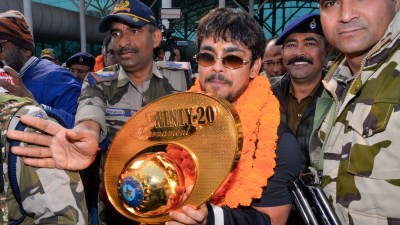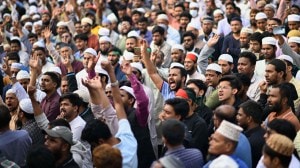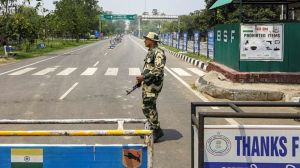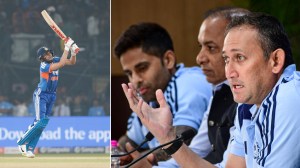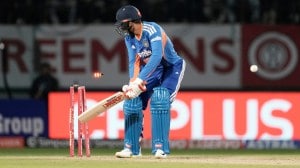Dominance of Jats to Muslims in Mewat: How Haryana’s caste-community matrix shapes up
After determining the outcome of the Lok Sabha polls in Haryana, certain communities will again play a key role a few months down the line when the Assembly elections come around
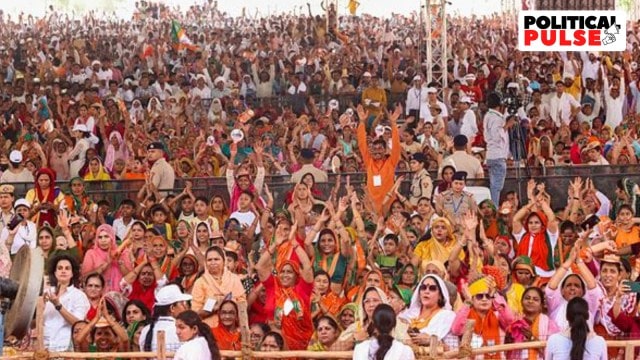 The parliamentary elections saw both the ruling BJP and the Congress balance out caste equations when fielding candidates for the 10 seats. In most of the seats, both fielded candidates from the same community or caste group. PTI
The parliamentary elections saw both the ruling BJP and the Congress balance out caste equations when fielding candidates for the 10 seats. In most of the seats, both fielded candidates from the same community or caste group. PTIIn Haryana, which voted in the parliamentary elections on Saturday and, crucially, will see an Assembly election later this year, caste is as entrenched a feature of politics as in the other Hindi heartland states.
The parliamentary elections saw both the ruling BJP and the Congress balance out caste equations when fielding candidates for the 10 seats. In most of the seats, both fielded candidates from the same community or caste group. For the BJP, the key was to consolidate key caste groups under the umbrella of Hindutva, given that Hindus comprise 87% of the state’s population. As a result, the party campaigned on issues such as Ram Temple and Article 370 abrogation and alleged that the Congress would give reservation to Muslims from the OBC share if it came to power.
Here are some of the key communities:
Jats
Jats form approximately 27% of the state’s population and dominated state politics till 2014. The same year, BJP won seven out of 10 Lok Sabha seats in Haryana and months later got a full majority with 47 seats in the 90-member Assembly, appointing Manohar Lal Khattar who is from the Punjabi community as the CM. The anti-incumbency sentiment against the 10-year rule of Bhupinder Singh Hooda in Haryana and the UPA in the Centre, and the rising Narendra Modi factor were the key factors for this change.
Jats have a strong presence in 40 of the 90 Assembly segments. Since 1966, when Haryana was carved out of Punjab, CMs from the Jat community have ruled the state for 33 years while non-Jat CMs have run the state for nearly 24 years, including Khattar’s nine-and-a-half-year tenure. Though Haryana’s first and second CMs, Bhagwat Dyal Sharma and Rao Birender Singh, were non-Jats, the tenures of non-Jat CMs have been brief, except that of Bhajan Lal who still holds the record for being Haryana’s longest-serving CM with over 11 years in power.
This time, both the BJP and the Congress fielded two Jats each: the BJP’s Dharambir in Bhiwani and Ranjit Singh in Hisar; and the Congress’s Deepender Hooda in Rohtak and Jai Prakash in Hisar. Both Rohtak and Hisar are Jat-dominated constituencies. The prominent Jat face who contested for the Jannayak Janta Party was its Hisar candidate Naina Chautala, the mother of former Deputy CM and party chief Dushyant Chautala. For the Indian National Lok Dal (INLD), the prominent Jat nominees were Sunaina Chautala in Hisar and Abhay Chautala in Kurukshetra.
SCs and Backward Classes
According to the 2011 Census, the Backward Classes comprise 35% of the population and Scheduled Castes (SCs) 20.17%. At present, two Lok Sabha seats are reserved for SCs: Ambala and Sirsa. Both witnessed high-profile contests in the parliamentary polls, with the Congress’s Kumari Selja and Banto Kataria taking on the BJP’s Ashok Tanwar and Varun Chaudhary in Sirsa and Ambala respectively. For both parties, a major campaign point was the alleged threat to the Constitution posed by the BJP-led NDA alliance’s stated goal of winning more than 400 seats.
Among the prominent candidates from Backward Class communities this time were Rao Inderjit Singh of the BJP and the Congress’s Raj Babbar in Gurgaon, which has a large population of Yadavs and Ahirs. Rao Inderjit, the sitting MP, is from the Ahir community. He has been winning from Gurgaon since 2009, when he contested on a Congress ticket. This time, he faced Babbar who is from the Sunar community. In the Bhiwani-Mahendragarh seat, the Congress’s Rao Dan Singh is also an Ahir. Given the Gujjar dominance in Faridabad, both the BJP and Congress fielded candidates from the community — Krishan Pal Gurjar for the BJP and Mahendra Pratap for the Congres. Gujjars, Yadavs, and Ahirs are categorised as Backward Class (B) in Haryana while Sunars come under the Backward Class (A) category.
Muslims
Muslims comprise approximately 7% of the state’s population and are mostly concentrated in southern Haryana’s Mewat region where they are an influential community in electoral terms. In Mewat, which has the three Assembly constituencies of Punhana, Nuh, and Feorzepur-Jhirka, more than 79% of the population is Muslim. All three are also part of the Gurgaon Lok Sabha seat along with the Assembly segments of Bawal (SC-reserved), Rewari, Pataudi (SC-reserved), Badshahpur, Gurgaon, and Sohna.
- 01
- 02
- 03
- 04
- 05


